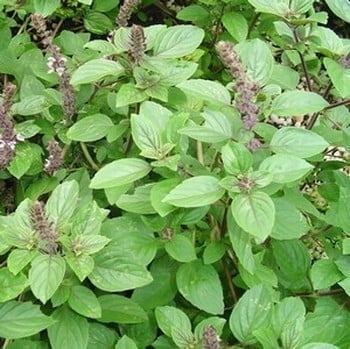African basil ( Ocimum gratissimum), also known as scent leaf, is a versatile herb deeply embedded in African traditional medicine and cuisine. Its rich phytochemical composition, including essential oils like eugenol, thymol, and linalool, along with flavonoids, tannins, and phenolic compounds, contributes to its wide range of therapeutic properties. This review delves into the pharmacological effects of African basil, exploring its potential benefits for cardiovascular health, digestive function, immune modulation, and disease prevention, highlighting its promising role in both traditional and modern integrative medicine.
The antimicrobial activity of African basil is a cornerstone of its traditional use. Studies have demonstrated its effectiveness against a variety of bacterial and fungal pathogens, including Staphylococcus aureus, Escherichia coli, and Candida albicans. This antimicrobial prowess supports its application in treating respiratory and gastrointestinal infections, aligning with its historical use in traditional healing practices. The presence of eugenol, thymol, and other essential oils contributes significantly to these antimicrobial effects, offering a natural defense against common infectious agents.
Beyond its antimicrobial action, African basil exhibits potent anti-inflammatory and antioxidant properties. Rich in flavonoids and polyphenols, it combats oxidative stress and chronic inflammation, key factors implicated in various diseases, including cardiovascular disorders and neurodegenerative conditions. These compounds act as free radical scavengers, protecting cells from damage and contributing to overall well-being. This antioxidant capacity underscores the potential of African basil in mitigating the risks associated with chronic inflammatory processes.
African basil also holds promise for supporting cardiovascular health. Its essential oils and flavonoids have demonstrated vasodilatory and hypotensive effects, suggesting a role in maintaining healthy blood pressure levels. Furthermore, research indicates potential benefits for lipid metabolism, including lowering LDL cholesterol, a key risk factor for cardiovascular disease. These findings suggest that regular consumption of African basil may contribute to a healthier cardiovascular profile.
The traditional use of African basil for digestive ailments is supported by scientific evidence. Its tannins and phenolic compounds promote healthy gastrointestinal motility, aiding in digestion and alleviating symptoms like indigestion, constipation, and bloating. Moreover, its antibacterial properties can help maintain a balanced gut microbiota and protect against foodborne infections. These combined actions make African basil a valuable ally for promoting digestive health and overall gastrointestinal well-being.
Emerging research highlights the immunomodulatory effects of African basil. Bioactive compounds within the plant stimulate immune cells, enhancing the body’s ability to resist infections and modulate inflammatory responses. Traditional herbal formulations incorporating African basil have been utilized to bolster immune function, particularly in individuals battling viral and bacterial diseases. These immunomodulatory properties further expand the potential applications of African basil in supporting health and resilience.
Given its broad spectrum of therapeutic benefits, African basil is increasingly integrated into naturopathic and holistic medicine practices. Its versatile applications include aromatherapy, where its essential oils are used to promote respiratory health and mental relaxation; herbal infusions or teas for digestive and metabolic support; and topical preparations for wound healing and skin infections. This adaptability makes African basil a valuable tool in the naturopathic toolkit, offering a natural approach to addressing various health concerns. Further research continues to explore the full potential of this remarkable herb, promising further advancements in disease prevention and integrative healthcare. Its accessibility and traditional usage, coupled with emerging scientific validation, position African basil as a promising natural remedy for a variety of health conditions. This comprehensive review underscores the significance of Ocimum gratissimum as a valuable resource in both traditional and modern therapeutic contexts, bridging ancient healing practices with contemporary scientific understanding.














